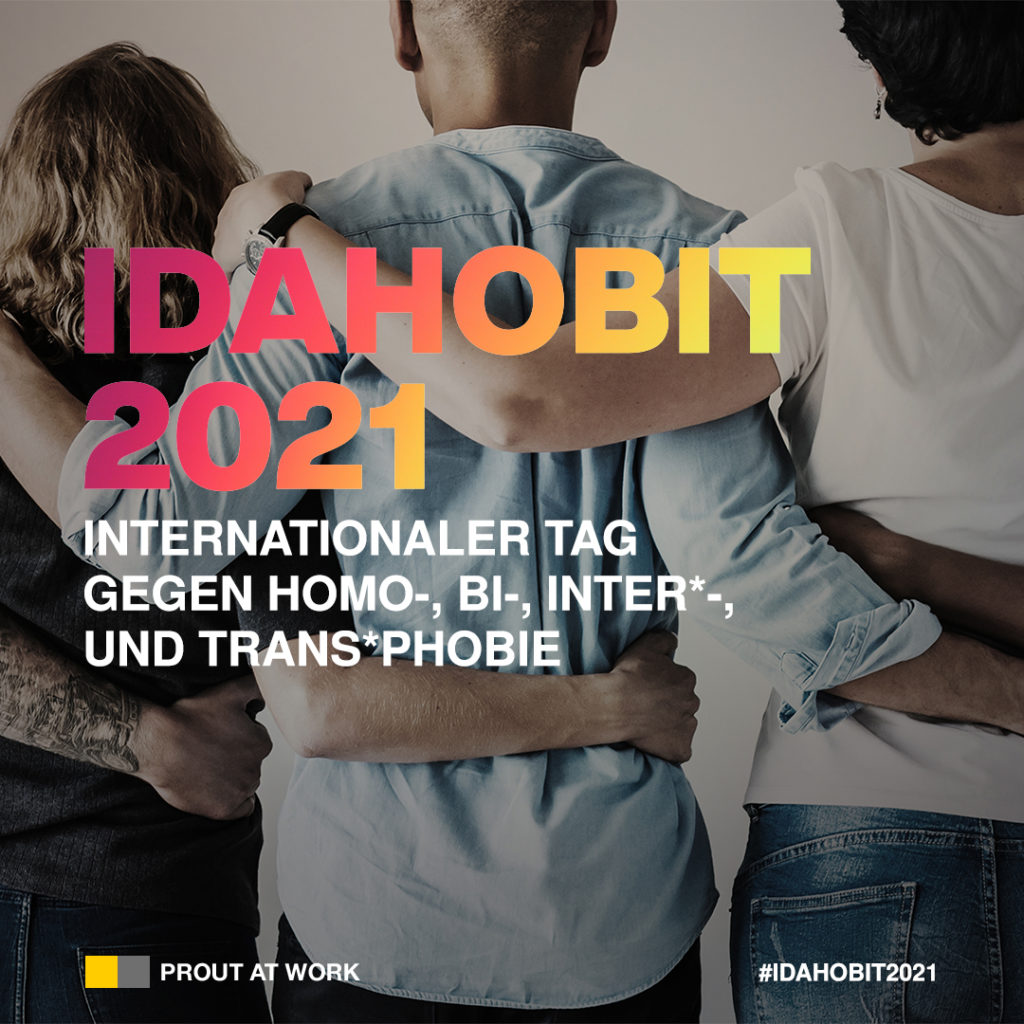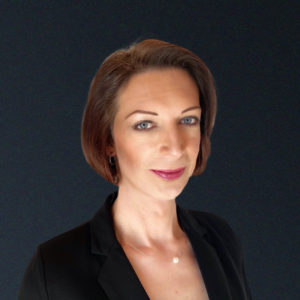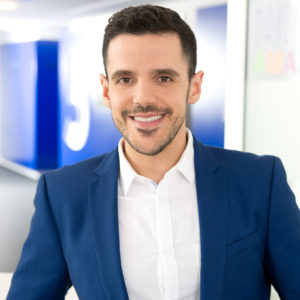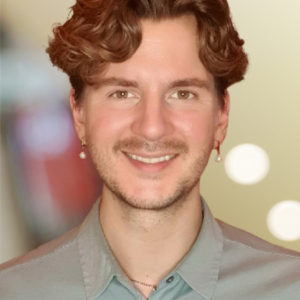
Campaign #QueerAtWork for IDAHOBIT
The International Day against Homophobia, Bi-, Inter- and Transphobia (IDAHOBIT) has been celebrated annually on May 17 since 2005 to highlight discrimination against the LGBT*IQ community, to raise awareness of existing inequality structures and to take a united stand for diversity and tolerance. May 17 marks the day in 1990 when the WHO removed homosexuality from the diagnostic code for diseases. For this year’s IDAHOBIT, we are calling on all LGBTIQ employees, regardless of their company, to post a portrait photo on their social media channels with the hashtag #QueerAtWork.
How can i participate in the Campaign?
- Inform and approach LGBT*IQ people from your own network and beyond to make them aware of the campaign
- Create a portrait photo using the templates, whether printed out or digitally using a tablet. (Be sure to clarify in advance whether you may use the employer’s company logo along with the template. Instead, you can use the company name or use the template without company information.)
- Post your own campaign photo along with the statement on May 17 2021, 9:00 am (CEST) with the respective hashtags and taggings on whatever social media channels you use
All the information, including the statement and template for the action, can be found summarized here as a download.
Hashtags
#IDAHOBIT2021
#QueerAtWork
#ProutAtWork
#FlaggeFürVielfalt
#LGBT
#[Diversity-Hashtag of your company]
#[Diversity-Hashtag of your corporate network]
Taggings
PROUT AT WORK
Facebook: @PrOut@Work
Instagram: @proutatwork
LinkedIn: @PROUT AT WORK-Foundation
Twitter: @proutatwork
If applicable, own company
Position yourself and your company as a supporter of the campaign and call on employees and executives to participate. Use the campaign to effectively advocate against LGBT*IQ discrimination internally and externally. The campaign is based on an idea by Magenta Pride, Deutsche Telekom’s LGBT*IQ employee network, and is supported by it.
IDAHOBIT 2021
Facts
Studies show that workplace discrimination experiences are still part of everyday life for many LGBT*IQ people. The study “Inter in the Office?!” The work situation of inter* people in Germany under a differential perspective to (endo) LGBTQ+ people.”, published in 2020 by Prof. Dr. Dominic Frohn states that 37.7% of (endo) trans and/or non-binary people surveyed, approx. 30% of inter* respondents and approx. 20& of (endo* cis) LGB+ people directly experience workplace discrimination , in the form of e.g. job rejection, transfer or dismissal.
It’s not surprising, then, that according to a Boston Consulting Group survey (2018/19), 22% of respondents see coming out at work as a potential career risk. 42% would lie to their manager about their sexual orientation and/or gender identity. More background information and studies on LGBT*IQ (in the workplace).
Support
Discrimination against LGBTIQ people is evident at other levels of society besides the workplace. Deal with these issues and make yourself aware of existing inequality structures. Only by becoming aware of these structures and grievances can you actively contribute to their dismantling. The points mentioned here are only an excerpt and not a complete list of possibilities with which you can start your commitment for LGBTIQ equal opportunities and against homophobia, bi-, inter- and transphobia.
Blood Donation
Discrimination against LGBT*IQ people is evident at other levels of society besides the workplace. Deal with these issues and make yourself aware of existing inequality structures. Only by becoming aware of these structures one can actively contribute to their dismantling. The points mentioned here are only an excerpt and not a complete list of possibilities with which you can start your commitment for LGBT*IQ equal opportunities and against homophobia, bi-, inter*- and trans*phobia.
EU LGBT*IQ Freedom Zone
In 2020, some Polish municipalities and cities declared their region as so-called “LGBT-free zones”. The establishment of entire regions where, according to the signatories, no LGBT*IQ people live is a clear attack on lesbian, gay, bisexual, trans and inter* people. As a first step, the European Parliament has declared the EU as an “LGBTIQ Freedom Zone” to send a clear message against the homophobic rhetoric and sentiment against sexual minorities in Poland. Find out more about the current events in this regard.
Selbstbestimmungsgesetz
The currently valid “Transsexuellengesetz” (TSG) is deeply discriminatory and should be replaced by the self-determination law. “The parliamentary group Bündnis 90/Die Grünen has submitted a bill “for the repeal of the transsexual law and introduction of the self-determination law” (19/19755)”. On May 19, there is a discussion on this in the Bundestag, in which it will also come to the vote. You can currently still contact suitable deputies in this regard.
A basic Law for all
Demand the addition of Article 3 GG, because LGBT*IQ people are still not protected by Article 3 in the German Basic Law. Many people within the LGBT*IQ community experience discrimination, exclusion and hate violence. We feel that a protection by the Basic Law is indispensable and therefore PROUT AT WORK is one of the first signatories of the appeal “A Basic Law for All”. Sign also now the petition or contact your delegates.
Legal Equality for queer Families
Stand up for the rights of rainbow families. Compared to children of heterosexual couples, the second mother must first adopt her child to provide legal protection – even if the parents are married. For example, support the nodoption campaign, which opposes stepchild adoption among rainbow families and advocates for recognition of parenthood.
People from the LGBT*IQ Community
As part of Awareness Day, we asked people from the LGBT*IQ community which role models helped them come out and why. We also asked them what structural changes they would like to see for more LGBT*IQ equality.

Sandra Vollmer, Vorstand Finanzen und HR, 1&1 Mail & Media Applications SE
Welche Role Models haben Dir beim Coming Out geholfen und wieso?
“Ich habe mich intensiv mit dem Outing v.a. anderer trans* Frauen beschäftigt. Sowohl im persönlichen Austausch mit anderen trans* Frauen, aber auch durch Recherche und das Studium vieler Biografien. Besonders bewegt haben mich die Lebenswege von Valerie Schnitzer (“Geheilte Seele – Befreites Ich”), die ich im Rahmen einer Lesung persönlich kennenlernen durfte, und natürlich die Geschichte von Anastasia Biefang, die als Führungskraft in der landläufig als „konservativ“ geltenden Bundeswehr ihre berufliche Transition erfolgreich vollzogen hatte. Wenn man es so will, war Anastasia für mich der Moment, wo ich mir sagte ‚Okay, Sie hat das klasse gemacht. Wenn das als Führungskraft in der Bundeswehr möglich ist, muss eine Transition in meinem Unternehmen für mich als Vorständin ebenfalls nicht unmöglich sein?‘ Und auch wenn ich am Ende die Kraft und den Mut für mein Outing aus ganz vielen unterschiedlichen Quellen geschöpft habe, war ihre Geschichte sicherlich eine davon!”
Welche strukturellen Änderungen in der Arbeitswelt wünschst Du Dir für mehr LGBT*IQ-Chancengleichheit?
“Ich würde mir wünschen, dass noch mehr Entscheider_innen althergebrachte Rollenbilder und Vorurteile abbauen, und mit geistiger Offenheit Vielfalt als Chance verstehen. Chance deshalb, weil ich fest davon überzeugt bin, wenn alle Mitarbeiter_innen ihre Talente einbringen und entfalten können, entstehen vielfältige und neue Ideen. Außerdem trägt das zu einem komplexeren und umfangreicheren Verständnis der Kund_innen bei, zu denen auch die LGBT*IQ Community zählt. Und zu guter Letzt erhöht das die Attraktivität als Arbeitgeber_in. Um das zu erreichen Bedarf es klarer Zielvorgaben durch die Unternehmensführung / Aufsichtsgremien, und ein professionelles Diversity Management, das einen bunten Blumenstrauß an Maßnahmen treibt und Fortschritte in der operationalen Umsetzung misst. Tendenziell also eher ein Marathon als ein Sprint! Und gerade deshalb sind Initiativen wie der IDAHOBIT so wichtig. Sie geben Denkanstöße, zeigen Handlungsalternativen auf und schaffen im besten Fall den Nährboden für ein Veränderungsbewusstsein.”
Sonsoles Pérez Laporta, Unternehmenskommunikation, AUDI Planung GmbH
Welche Role Models haben Dir beim Coming Out geholfen und wieso?
“Inspirierende Role Models haben zwei Merkmale: Wir können uns mit ihnen identifizieren und sie zeigen uns, was wir werden können: stark, mutig und sichtbar.”
Welche strukturellen Änderungen in der Arbeitswelt wünschst Du Dir für mehr LGBT*IQ Chancengleichheit?
“Coaching und Mentoring-Programme für die LGBT*IQ-Community und Aufklärung für potentielle Allies. In der Diversität sind wir stark, wenn uns die Vielfalt und ihre Vorteile bewusst sind und gefördert werden.”


Thiago Machado, Global Senior Brand Manager, Beiersdorf
Which role models helped you coming out and why?
“Having peers and leaders openly out gave me the confidence to be myself and authentic at work – it gave me the confidence to be myself and keep working continuously to build a successful career. Having a role model made me realize I can be myself, that I can share about my personal life and take initiatives for a more inclusive environment. It does make a difference and I strongly believe that having people to look up to encourages me every day to do my best and be the example for the others around me.”
Which structural changes in the work environment aiming for equality of opportunities for the LGBT*IQ community do you wish for?
“First and foremost it is key that we integrate clear anti-discrimination guidelines into our HR policies and that we enforce these when we are made aware of behaviour that is not in line with these guidelines. Furthermore, every employer should offer similar benefits to same sex couples as they would to non-same-sex couples, that seems only fair to me! I also really believe in training to educate ALL our employees on Diversity & Inclusion, this plays a very important role for an inclusive and respectful environment. It gives the employees the opportunity to put themselves in the others’ shoes, respecting and valuing the diversity & inclusion. I wish for an environment where the workforce, globally, has the tools and information to understand that an inclusive workplace means more motivation, more productivity and more authenticity.
I wish that it is reflected not only in all internal touchpoints – recruitment & development, but also externally, positively impacting the society.”
Maik Brunkow, Employer Branding, KGMG Deutschland
Welche Role Models haben Dir beim Coming Out geholfen und wieso?
“Mein erstes großes Coming Out hatte ich leider nicht selbst bestimmt, aber ich habe meine sexuelle Orientierung auch mit 13 schon nicht verleugnet. Das lag zum Teil auch an vielen verschiedenen Stars im Musikbusiness, die schon erfolgreich Out waren. Ganz explizit waren das der Keyboarder einer deutschen Rockpopband und der Gewinner des britischen Castingformats Pop Idol.
Als nicht binäre Person hatte ich nie ein richtiges Coming Out. Einzelne Freund*innen waren Teil des Prozesses, in dem mir klar geworden ist, dass die, die mir in meinem Leben in unterschiedlichen Situationen gesagt haben, ich wäre entweder zu männlich oder zu weiblich, einfach unrecht hatten. In dieser Zeit hat es sehr geholfen, dass ein genereller gesellschaftlicher Wandel stattfindet. Die vielen Menschen, die sich nicht mehr einem binären Geschlechtssystem einordnen wollen und das öffentlich zeigen, sind für mich unglaublich wichtig. Irgendwann habe ich dann einfach angefangen, in meine Profile reinzuschreiben, dass ich Pronomen ablehne, wenn sie nicht benötigt werden. Sehr hilfreich war es für mich aber auch, dass meine Führungskraft aus einem Praktikum, das ich mal gemacht habe, jetzt auch in ihren Online-Profilen stehen hatte, dass sie nun they/them Pronouns verwendet.”
Welche strukturellen Änderungen in der Arbeitswelt wünschst Du Dir für mehr LGBT*IQ Chancengleichheit?
“Manchmal könnte man denken, wir wären schon am Ende der Gleichberechtigung angekommen. Ich glaube nicht, dass wir schon soweit sind. Auf gesellschaftlicher Ebene müssen wir unbedingt die rechtlichen Hürden für Geschlechtsangleichungen heruntersetzen und dringend die Stiefkindadoption für gleichgeschlechtliche Paare erleichtern. Am Arbeitsplatz folgen daraus für mich ganz konkrete Änderungen: es gibt in vielen Unternehmen immer noch keine Möglichkeit, Angaben zum Geschlecht mal eben zu ändern. Außerdem unterscheiden Policies zur Elternzeit und zur Rückkehr aus der Elternzeit noch häufig zwischen Männern und Frauen. Gleichgeschlechtliche Paare werden hier nur selten direkt angesprochen. Neben einem langfristigen Wandel von Unternehmenskulturen, sehe ich hier die größten Baustellen.”


Merve Aksoy, Schauspielerin
Welche Role Models haben Dir beim Coming Out geholfen und wieso?
“Maren Kroymann, ihre selbstbewusste offene Art hat mir gezeigt wie selbstverständlich das ist und trotzdem eine erfolgreiche Schauspielerin sein kann. Ruby Rose, sie steht zu sich und ihrem Lifestyle, ihrem Style. Sie zeigt die „nackte“ Wahrheit. Sie engagiert sich für homosexuelle Rechte. Ich finde sie sehr mutig. Ich möchte auch andere inspirieren und unterstützen durch meine Sichtbarkeit beim Coming Out zu helfen.”
Welche strukturellen Änderungen in der Arbeitswelt wünschst Du Dir für mehr LGBT*IQ Chancengleichheit?
” Ich wünsche mir besseren Schutz vor Diskriminierung. Firmen sollen Diversity-Trainings und geschlechtsneutrale Toiletten anbieten. In Jobbeschreibungen die neutrale/korrekt gegenderte Version wählen (also “Fachperson” statt Fachmann, oder Reinigungsfachkraft statt Putzfrau). Die Möglichkeit gerade für trans Personen, schon vor der öffentlichen Namensänderung den gewählte Namen im Betrieb/Mailadresse usw. zu verwenden. Eine interne Ansprechstelle, wo Diskriminierung (von Kund*innen oder Mitarbeitenden) gemeldet werden kann.”
Counseling
LesMigras
“LesMigraS is the anti-discrimination and anti-violence section of lesbian counseling Berlin e.V.”
Gladt e.v.
” GLADT is a self-organization of black and of color lesbians, gays, bisexuals, trans, inter and queer people in Berlin, which stands up against racism, sexism, trans* and homophobia, ableism and other forms of discrimination and offers a diverse range of counseling services.”
Antidiskriminierungsstelle des Bundes
“The counseling team with lawyers can inform you about your rights in a case of discrimination or sexual harassment, show you possibilities if and how you can enforce your rights, strive for an amicable conflict resolution and try to name experts close to your home.”
Bundesverband trans*
“The Bundesverband Trans* (BVT) sees itself as an association of individuals, groups, clubs, associations and initiatives at regional, state and national level, whose common endeavor is the commitment to gender diversity and self-determination and the commitment to human rights in terms of respect, recognition, equality, social participation and health of trans or persons not located in the binary gender system.”
Deutsche Gesellschaft für Transidentität und Intersexualität e.V.
“Die dgti hat sich zum Ziel gesetzt, die Akzeptanz von Transidenten innerhalb der Gesellschaft zu fördern und deren Stigmatisierung entgegenzuwirken. Sie soll Betroffene und Interessierte beraten und betreuen, sofern dies gewünscht wird. Ein wesentlicher Aspekt der Arbeit sollte die (Re-)Integration von Betroffenen in den Arbeitsprozess sein, um so der Gefahr des sozialen Abstiegs zu begegnen, der heutzutage noch mit dem sozialen Wechsel verbunden ist. Sie tritt für mehr Offenheit der eigenen Identität gegenüber ein und trägt der Vielfalt menschlichen Daseins Rechnung.”
We look forward to a successful campaign!
If you have any further questions, please do not hesitate to contact us.
